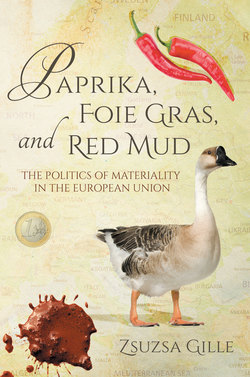Paprika, Foie Gras, and Red Mud

Реклама. ООО «ЛитРес», ИНН: 7719571260.
Оглавление
Zsuzsa Gille. Paprika, Foie Gras, and Red Mud
PAPRIKA, FOIE GRAS, and RED MUD. THE POLITICS OF MATERIALITY. IN THE EUROPEAN UNION
CONTENTS
ACKNOWLEDGMENTS
INTRODUCTION. HUNGARY AND THE EU IN THE POLITICAL. AND SCHOLARLY IMAGINATION
PICTURES OF AN ACCESSION
GLOBAL ETHNOGRAPHY
1
THE 2004 HUNGARIAN. PAPRIKA BAN
SAFETY AS PRACTICE. Practicing Paprika
Hungarian Agriculture in the European Union
Adulteration Practices
Hungarian or Safe?
SAFETY AS TRANSNATIONALITY
Consequences
CAN A FUNGUS SPEAK?
2
THE 2008 FOIE GRAS. BOYCOTT. THE ANTI–FOIE GRAS CAMPAIGN
THE POLITICAL ECONOMY OF GAVAGE
ETHICS AS TRANSNATIONALITY
Renationalizing Ethics
Struggles for Moral Sovereignty
ETHICS AS PRACTICE
The Production Process and Animal Living Conditions
3
THE 2010. RED MUD SPILL
RED MUD
THE HUNGARIAN ALUMINUM INDUSTRY. AND THE HISTORY OF RED MUD
ENVIRONMENTAL REGULATION AS TRANSNATIONAL
Regulation on Different Scales
Western Regulation of Red Mud
ENVIRONMENTAL REGULATION AS PRACTICE
Privatization and Ownership of the Red Mud Lagoons
Red Mud as a Source of Profit. Lagoon Rental
Future Recovery of Precious Minerals
THE EU’S REACTION
THE TWO GAPS OF POSTACCESSION. ENVIRONMENTAL REGULATION
4
NEOLIBERALISM, MOLECULARIZATION, AND. THE SHIFT TO GOVERNANCE
EUROPEAN UNION: SMALL OR BIG?
THE SOCIOLOGY OF SIZE
REGULATORY INTERPRETATIONS OF THE CASE STUDIES
The Neoliberalism Argument
The New Regulatory Paradigm Argument
The Cultural Commodification Argument
CONCLUSION. THE MATERIALIZATION. OF POLITICS
TRANSNATIONAL HYBRID ONTOLOGIES
POLITICS AND MATERIALITY
THE MATERIALIZATION OF POLITICS
NOTES. INTRODUCTION
1. THE 2004 HUNGARIAN PAPRIKA BAN
2. THE 2008 FOIE GRAS BOYCOTT
3. THE 2010 RED MUD SPILL
4. NEOLIBERALISM, MOLECULARIZATION, AND THE SHIFT TO GOVERNANCE
CONCLUSION
REFERENCES
INDEX
Отрывок из книги
FOIE GRAS,
and RED MUD
.....
Instead of taking them to be examples of the particular qua local, I read the contradiction between these two sets of images, and their attendant list of binaries, as evidence that what we need is a new reading of the postsocialist transition and EU accession. Two metaphors have been helpful in understanding these processes. Both have been productive but also selective in terms of what type of analysis they made possible. One is the metaphor of tabula rasa, the other is “fuzziness.”
Early observers of the postsocialist transition noted that the attendant transformations—democratization, privatization, marketization, Europeanization—did not take place on a tabula rasa.11 What they meant to convey by invoking the blank slate metaphor is, first, that building a new type of society does not take place in a vacuum, nor can it commence from scratch; people of the future are people of the past, and short of brainwashing them, you will have to build democracy not with the people you want but with the people you have. Not only can one not just purge everything in the course of transition itself, but the local social and cultural conditions will also affect the emerging nature of capitalism and democracy. These arguments were developed and demonstrated in dozens of brilliant studies of land reform, labor relations, and civil society conducted in all the formerly socialist countries.
.....